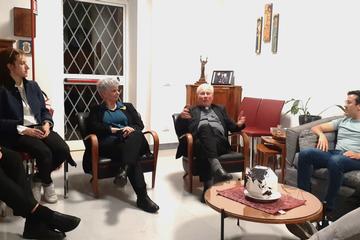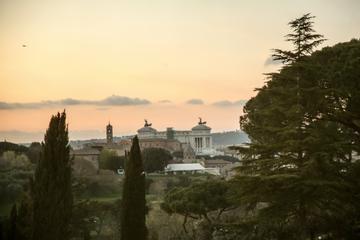
CAMBRIDGE, Mass. — After visiting the United Arab Emirates in February, Pope Francis is leaving for another Muslim majority country, Morocco, March 30-31. In the video message Pope Francis recorded ahead of his visit, he told the Moroccan people that he is traveling there as “a pilgrim of peace and fraternity,” echoing the title of the recent “Document on Human Fraternity,” which he signed with Grand Imam of Al-Azhar Ahmed el-Tayeb. We asked Peter Dziedzic, Lay Centre alumnus and doctoral candidate in the study of religion at Harvard University, to share his thoughts about the upcoming visit.
This weekend, Pope Francis travels to Morocco, the first papal visit to the North African country since John Paul II’s visit in 1985. This trip comes in the wake of the pope’s visit to Abu Dhabi and the significant joint declaration, “Document on Human Fraternity,” by Pope Francis and the grand imam of Al-Azhar, Ahmed el-Tayeb. Such a statement displays the pope’s radical commitment to building cultures of fraternity through interreligious and intercultural dialogue, particularly with Muslims. What can we expect from the short, though significant, the papal visit to Morocco?
Morocco was a commercial, political, cultural, and religious crossroads for centuries. Today, Morocco is at the centre of global migration and refugee networks. Many migrants and refugees from sub-Saharan Africa travel overland to Morocco, hoping to enter Europe — either by expensive, dangerous, and unregulated boats that ferry people to the Spanish and Italian coasts — or by crossing over the land borders of the Spanish enclaves in Morocco — Melilla and Ceuta. Many of these migrants are also Christians.
As a country in which 99 percent of people identify as Muslims, the presence of both migrants and Christians as “other” presents both a need for pastoral care and for building frameworks of human fraternity rooted in understanding and compassion, as urged by both Pope Francis and Ahmed al-Tayeb. Though Morocco’s Christian community is small, Pope Francis will spend time with both Muslim and Christian communities, as an ambassador of interreligious dialogue and as a pastor to the minority Christian community.
Given this situation, I think it is also important that the pope draws on the unique and deep spiritual resources of Morocco by also deepening Catholic dialogue with Sufi communities. Morocco was a centre of a unique and rich culture of Sufism (Islamic mysticism). Moroccan Sufis often have particular emphases on the presence of holy saints (“awliya”) in the world, saint visitation (“tabarruk”) as a medium of grace and healing, and the reality of blessings (“barakah”) that radiates from sacred persons and places. A very cursory and introductory study will reveal rich parallels with Catholic spirituality and theology.
The pope’s visit to a theologically and spiritually rich country presents unique opportunities to have interreligious conversations about sanctity and sanctification, particularly the sanctification of the world and of human relationships. Such concepts, which are central in both Moroccan Islam and Catholicism, offer concrete opportunities to deepen theological reflections on the sanctity of our shared world and of human communities. While this sort of theological dialogue may not be the main theme of the pope’s visit, it will certainly serve as a springboard for these necessary and rich conversations.
The challenging situation of Christians and migrants in Morocco, coupled with the unique resources of Moroccan Sufi spirituality, highlighted by the Pope’s visit, should serve as a call for Christians to deepen and extend their vocation as witnesses to God’s presence in the world.
How can Moroccan Sufism help Christians to appreciate the themes of stewardship and sanctity in their own tradition? How can the resources of Moroccan Sufism contribute to an interreligious dialogue of stewardship, fraternity, and fostering the sanctity of the world? Given the condition of Christian and migrant minority communities in Morocco, how might this encourage Christians to offer compassionate, constructive models for how religious minorities and migrants in Europe might be treated with dignity, rooted in a call for fraternity and stewardship?
I hope the pope’s courage to “go to the peripheries” of our religious understanding, of societies, and of human relationships will inspire Christians to consider the deep interreligious vocation to human fraternity. The pope’s visit to Morocco only solidifies this work and vocation for all of us.
Peter Dziedzic lived at The Lay Centre in 2013-14 as a Russell Berrie Fellow in Interreligious Dialogue and in 2016-2017 as a student at the PISAI. He researched Sufi poetry in Morocco under the auspices of a Fulbright grant and is interested in literature and poetry as sites of the interreligious and theological encounter.


